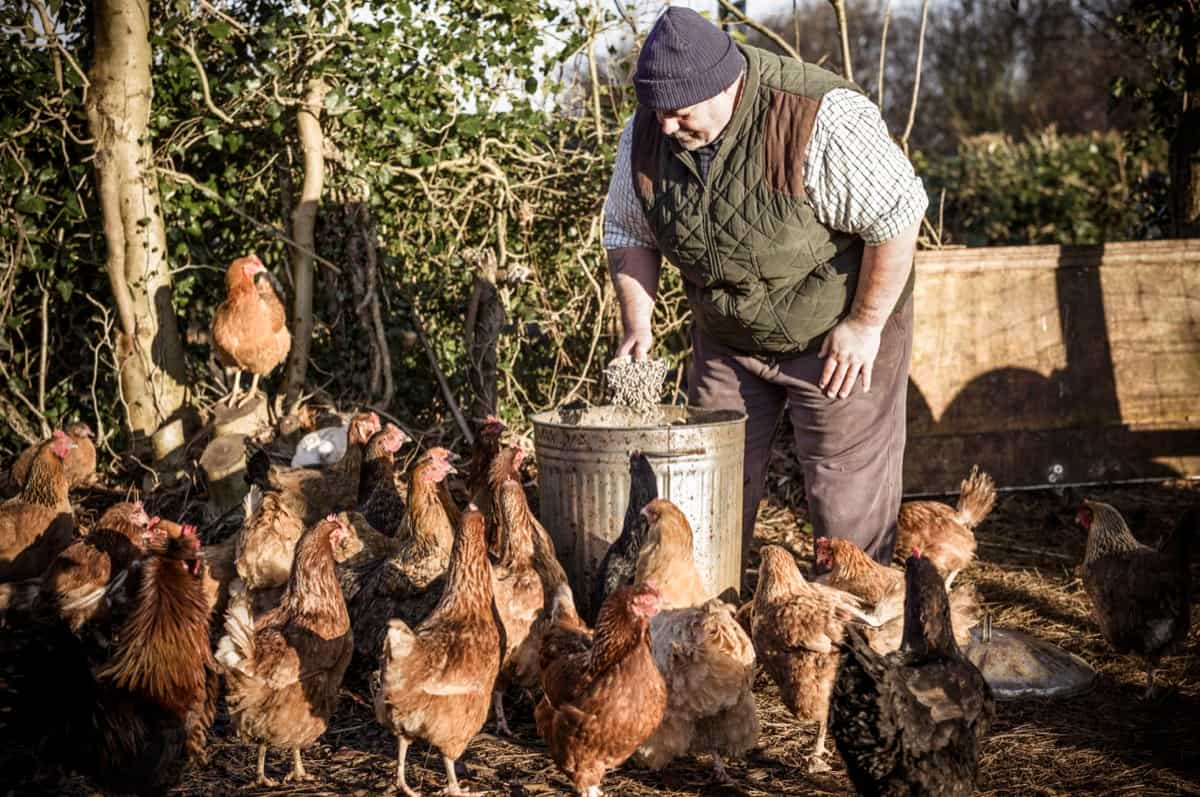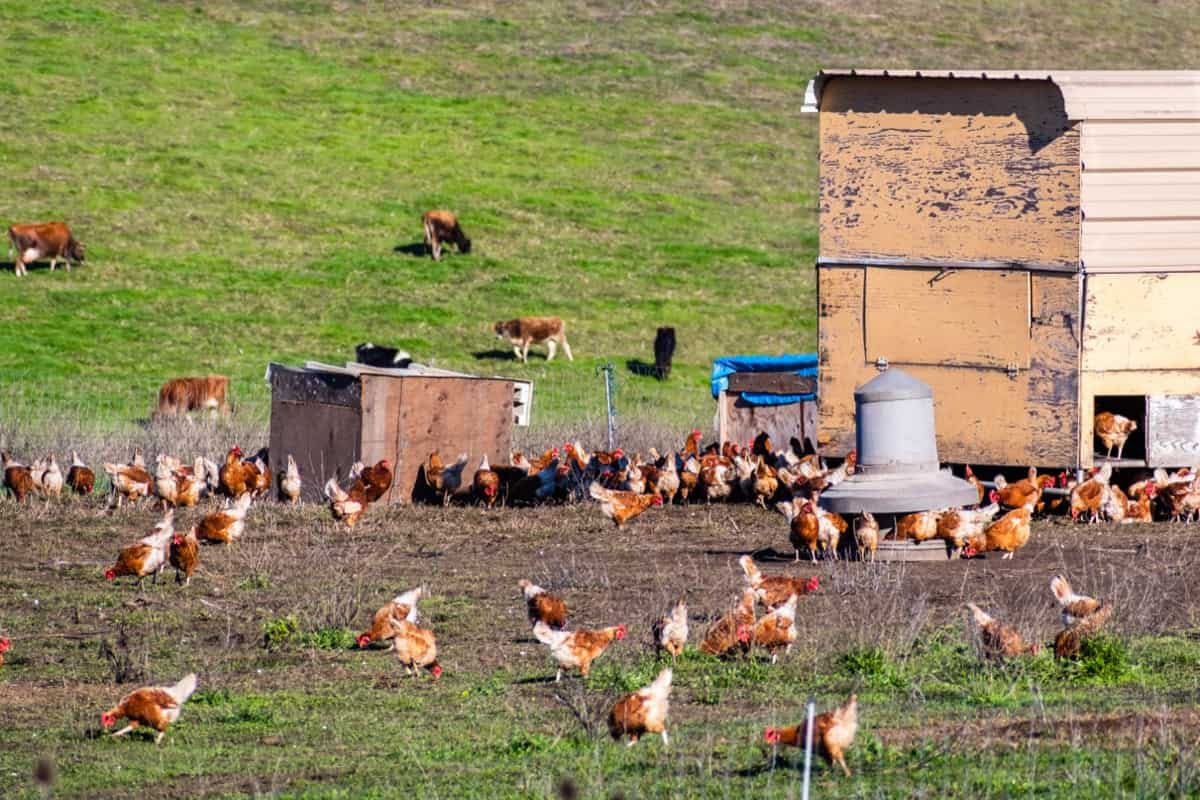Raising organic chickens is more than just a trend; it’s a commitment to the welfare of the animals and the health of those who will eventually consume the meat. Organic chicken farming revolves around nurturing the chickens in an environment as natural as possible, without synthetic chemicals, antibiotics, or genetically modified organisms. This article offers a comprehensive manual for raising organic meat chickens effectively and in an environmentally-friendly manner.

How to Raise Organic Meat Chickens
Best Organic Feed for Meat Chickens
Feeding chickens organically is central to organic meat chicken farming. Organic chicken feed is free from chemicals, antibiotics, and genetically modified organisms. Chickens need organic feed for their health and to play a crucial role in the quality of meat they produce. The question “Do chickens need organic feed?” can be emphatically answered with a “Yes.”
Homemade organic chicken feed can include a mix of grains, like corn, wheat, oats, barley, and millet, along with protein sources, such as soybeans or peas. Moreover, chickens need a healthy supply of calcium for strong bones and eggshells, which can be provided through crushed oyster shells or limestone.
Organic Chicken Coop Design and Construction
An organic chicken coop is more than just a shelter for your birds. It’s a space where they can exhibit their natural behaviors freely. Designing and constructing a chicken coop organically implies creating a spacious, well-ventilated, and comfortable environment. Chickens need ample space to move around, roost, and forage. The coop must protect against extreme weather conditions and predators. Using untreated and non-toxic materials for construction is crucial in raising organic chicken.
Tips for Organic Meat Chicken Breeds Selection
Selecting the right breed is crucial when raising organic meat chickens. You must select a breed that thrives in your specific climate, has a good feed-to-meat conversion ratio, and is resilient to diseases. The breed should also align with your purpose, whether you want to raise organic chicken for meat, eggs, or both. It’s advisable to consider heritage breeds as they’re often hardier and more adaptable to organic farming practices than industrial breeds.
Natural Remedies for Organic Meat Chicken Health
Maintaining the health of chickens organically demands a proactive approach. Prevention is better than cure, especially when you’re avoiding synthetic medications. Regular inspections for signs of ill health, appropriate vaccination, and maintaining clean and stress-free living conditions can prevent many diseases. Natural remedies, like herbs, essential oils, and probiotics, can be used in the event of sickness. Garlic, oregano, and apple cider vinegar are natural remedies for improving organic meat chicken health.
Organic Meat Chicken Farming Techniques
Organic meat chicken farming techniques focus on providing a life for the chickens that’s as natural as possible. It involves allowing the chickens to forage for food, providing them access outdoors, and not overcrowding them. The use of organic chicken feed and avoidance of antibiotics and hormones are also cornerstones of these techniques. Additionally, techniques such as rotating pasture for the chickens can contribute to their health and the health of the land.
In case you missed it: Amberlink Chicken Breed Facts: Egg Laying, Temperament, and Physical Characteristics

How to Raise Organic Meat Chickens on a Small Scale
Raising organic meat chickens on a small scale can be feasible and profitable. A small-scale setup requires less initial investment and can be easier to manage organically. Start with a small flock and gradually expand as you gain experience. Choose a suitable breed, provide organic feed, and construct a coop that gives them ample space to move around and protect them from predators. Remember, the goal is to create a natural and stress-free environment for the chickens.
Organic Meat Chicken Feed Recipe
Creating homemade organic chicken feed is an excellent way to ensure your chickens receive a balanced diet without synthetic additives. A basic recipe can consist of various whole grains like corn, oats, barley, and wheat, offering both carbs and fiber. Legumes like soybeans or peas can serve as a protein source.
You may add small amounts of sunflower seeds for additional fats. Crushed oyster shells or limestone should be included for calcium. Finally, consider adding a poultry premix to ensure your chickens receive all the essential vitamins and minerals. Remember, the feed quality will directly impact your chickens’ health and the meat’s quality.
Managing Organic Meat Chicken Pests and Diseases
Managing pests and diseases is integral to raising healthy, organic meat chickens. Regular inspections help identify any signs of pests or diseases early, enabling quick intervention. Maintain clean, dry, and well-ventilated coops to reduce the risk of diseases. Natural deterrents like diatomaceous earth can be used to manage pests like mites and lice. Prevention should be emphasized for diseases through proper vaccination and a well-balanced organic diet that strengthens the chickens’ immune systems.
Certification Requirements for Organic Meat Chicken Farming
Obtaining organic certification for your meat chicken farm can greatly boost your business, as consumers often trust certified products more. However, certification requirements vary by region and are subject to local organic standards.
Generally, they involve demonstrating that your farming practices align with organic principles such as feeding the chickens with 100% organic feed, providing them access to outdoors, abstaining from using antibiotics and hormones, and ensuring the overall welfare of the chickens. Be prepared for inspections and thorough documentation to verify that your practices adhere to the organic standards.
Maintaining the Organic Life Cycle
An often overlooked but important aspect of raising organic meat chickens is maintaining the organic life cycle. This involves using organic practices with the chickens and the land and other resources involved in the farming process. The rotation of crops on the land used for free-range chickens is crucial to keep the soil healthy.
The crops grown should also be organic, and the manure produced by the chickens can be used as an organic fertilizer. The disposal of waste from the coop should be managed in an environmentally friendly way, and water use should be optimized to conserve resources. This comprehensive approach ensures that raising chickens is organic, sustainable, and in harmony with nature.
In case you missed it: 8 Choices for Chicken Coop Bedding: A Comprehensive Guide

Conclusion
The journey to raise organic meat chickens requires dedication, patience, and a deep respect for nature and animal welfare. It’s not just about producing healthier chicken meat but also about upholding a farming practice that aligns with the sustainability principles and ethical treatment of animals. Whether you want to raise organic chicken for meat, eggs, or both, this comprehensive guide is valuable.
- Feed Your Flock for Less: Top 10 Tips to Save on Chicken Feed
- Ultimate Guide to Ossabaw Island Hog: Breeding, Raising, Diet, and Care
- Hatching Answers: The Top 10 Reasons Your Chickens Aren’t Laying Eggs
- Eggs and Economics: Breaking Down the Cost of Raising Backyard Chickens
- Defend Your Greens: Proven Methods to Keep Iguanas Out of Your Garden
- Ultimate Guide to Cinnamon Queen Chicken: A Comprehensive Guide for Beginners
- Ultimate Guide to California Tan Chicken: Breeding, Raising, Diet, Egg-Production and Care
- Ultimate Guide to Marsh Daisy Chicken: Breeding, Raising, Diet, and Care
- 10 Types of Chicken Farming Businesses You Can Start for Profits